- Home
- J. G. Ballard
The Complete Short Stories Page 34
The Complete Short Stories Read online
Page 34
'It was murder, of course,' I told him. 'Believe me, I saw the glint in her eye. She really wanted you killed.'
Tristram shrugged. 'Don't look so shocked, old boy. After all, poetry is a serious business.'
Raymond and Tony Sapphire knew nothing of what had happened. Tristram had put together a story of how Aurora had suffered a sudden attack of claustrophobia, and rushed off in a frenzy.
'I wonder what Aurora will do now,' Tristram mused. 'Her prophecy's been fulfilled. Perhaps she'll feel more confident of her own beauty. You know, she had a colossal sense of physical inadequacy. Like the original Melander, who was surprised when Corydon killed himself, Aurora confused her art with her own person.'
I nodded. 'I hope she isn't too disappointed when she finds poetry is still being written in the bad old way. That reminds me, I've got twenty-five pages to fill. How's your VT set running?'
'No longer have one. Wrecked it the morning you phoned up. Haven't used the thing for years.'
I sat up. 'Do you mean that those sonnets you've been sending in are all hand-written?'
'Absolutely, old boy. Every single one a soul-grafted gem.'
I lay back groaning. 'God, I was relying on your set to save me. What the hell am I going to do?'
Tristram grinned. 'Start writing it yourself. Remember the prophecy. Perhaps it will come true. After all, Aurora thinks I'm dead.'
I cursed him roundly. 'If it's any help, I wish you were. Do you know what this is going to cost me?'
After he had gone I went into the study and added up what copy I had left, found that there were exactly twenty-three pages to fill. Oddly enough that represented one page for each of the registered poets at Vermilion Sands. Except that none of them, apart from Tristram, was capable of producing a single line.
It was midnight, but the problems facing the magazine would take every minute of the next twenty-four hours, when the final deadline expired. I had almost decided to write something myself when the telephone rang. At first I thought it was Aurora Day - the voice was high and feminine - but it was only Fairchild de Mille.
'What are you doing up so late?' I growled at him. 'Shouldn't you be getting your beauty sleep?'
'Well, I suppose I should, Paul, but do you know a rather incredible thing happened to me this evening. Tell me, are you still looking for original hand-written verse? I started writing something a couple of hours ago, it's not bad really. About Aurora Day, as a matter of fact. I think you'll like it.'
Sitting up, I congratulated him fulsomely, noting down the linage.
Five minutes later the telephone rang again. This time it was Angel Petit. He too had a few hand-written verses I might be interested in. Again, dedicated to Aurora Day.
Within the next half hour the telephone rang a score of times. Every poet in Vermilion Sands seemed to be awake. I heard from Macmillan Freebody, Robin Saunders and the rest of them. All, mysteriously that evening, had suddenly felt the urge to write something original, and in a few minutes had tossed off a couple of stanzas to the memory of Aurora Day.
I was musing over it when I stood up after the last call. It was 12.45, and I should have been tired out, but my brain felt keen and alive, a thousand ideas running through it. A phrase formed itself in my mind. I picked up my pad and wrote it down.
Time seemed to dissolve. Within five minutes I had produced the first piece of verse I had written for over ten years. Behind it a dozen more poems lay just below the surface of my mind, waiting like gold in a loaded vein to be brought out into daylight.
Sleep would wait. I reached for another sheet of paper and then noticed a letter on the desk to the IBM agency in Red Beach, enclosing an order for three new VT sets.
Smiling to myself, I tore it into a dozen pieces.
1961
Deep End
They always slept during the day. By dawn the last of the townsfolk had gone indoors and the houses would be silent, heat curtains locked across the windows, as the sun rose over the deliquescing salt banks. Most of them were elderly and fell asleep quickly in their darkened chalets, but Granger, with his restless mind and his one lung, often lay awake through the afternoons, while the metal outer walls of the cabin creaked and hummed, trying pointlessly to read through the old log books Holliday had salvaged for him from the crashed space platforms.
By six o'clock the thermal fronts would begin to recede southwards across the kelp flats, and one by one the airconditioners in the bedrooms switched themselves off., While the town slowly came to life, its windows opening to the cool dusk air, Granger strode down to breakfast at the Neptune Bar, gallantly doffing his sunglasses to left and right at the old couples settling themselves out on their porches, staring at each other across the shadow-filled streets.
Five miles to the north, in the empty hotel at Idle End, Holliday usually rested quietly for another hour, and listened to the coral towers, gleaming in the distance like white pagodas, sing and whistle as the temperature gradients cut through them. Twenty miles away he could see the symmetrical peak of Hamilton, nearest of the Bermuda islands, rising off the dry ocean floor like a flat-topped mountain, the narrow ring of white beach still visible in the sunset, a scum-line left by the sinking ocean.
That evening he felt even more reluctant than usual to drive down into the town. Not only would Granger be in his private booth at the Neptune, dispensing the same mixture of humour and homily - he was virtually the only person Holliday could talk to, and inevitably he had come to resent his dependence on the older man - but Holliday would have his final interview with the migration officer and make the decision which would determine his entire future.
In a sense the decision had already been made, as Bullen, the migration officer, realized on his trip a month earlier. He did not bother to press Holliday, who had no special skills to offer, no qualities of character or leadership which would be of use on the new worlds. However, Bullen pointed out one small but relevant fact, which Holliday duly noted and thought over in the intervening month.
'Remember, Holliday,' he warned him at the end of the interview in the requisitioned office at the rear of the sheriff's cabin, 'the average age of the settlement is over sixty. In ten years' time you and Granger may well be the only two left here, and if that lung of his goes you'll be on your own.'
He paused to let this prospect sink in, then added quietly: 'All the kids are leaving on the next trip - the Merryweathers' two boys, Tom Juranda (that lout, good riddance, Holliday thought to himself, look out Mars) - do you realize you'll literally be the only one here under the age of fifty?'
'Katy Summers is staying,' Holliday pointed out quickly, the sudden vision of a white organdy dress and long straw hair giving him courage.
The migration officer had glanced at his application list and nodded grudgingly. 'Yes, but she's just looking after her grandmother. As soon as the old girl dies Katy will be off like a flash. After all, there's nothing to keep her here, is there?'
'No,' Holliday had agreed automatically.
There wasn't now. For a long while he mistakenly believed there was. Katy was his own age, twenty-two, the only person, apart from Granger, who seemed to understand his determination to stay behind and keep watch over a forgotten Earth. But the grandmother died three days after the migration officer left, and the next day Katy had begun to pack. In some insane way Holliday had assumed that she would stay behind, and what worried him was that all his assumptions about himself might be based on equally false premises.
Climbing off the hammock, he went on to the terrace and looked out at the phosphorescent glitter of the trace minerals in the salt banks stretching away from the hotel. His quarters were in the penthouse suite on the tenth floor, the only heat-sealed unit in the building, but its steady settlement into the ocean bed had opened wide cracks in the load walls which would soon reach up to the roof. The ground floor had already disappeared. By the time the next floor went - six months at the outside - he would have been forced to leave the
old pleasure resort and return to the town. Inevitably, that would mean sharing a chalet with Granger.
A mile away, an engine droned. Through the dusk Holliday saw the migration officer's helicopter whirling along towards the hotel, the only local landmark, then veer off once Bullen identified the town and circle slowly towards the landing strip.
Eight o'clock, Holliday noted. His interview was at 8.30 the next morning. Bullen would rest the night with the Sheriff, carry out his other duties as graves commissioner and justice of the peace, and then set off after seeing Holliday on the next leg of his journey. For twelve hours Holliday was free, still able to make absolute decisions (or, more accurately, not to make them) but after that he would have committed himself. This was the migration officer's last trip, his final circuit from the deserted cities near St Helena up through the Azores and Bermudas and on to the main Atlantic ferry site at the Canaries. Only two of the DEEP END 237 big launching platforms were still in navigable orbit - hundreds of others were continuously falling out of the sky - and once they came down Earth was, to all intents, abandoned. From then on the only people likely to be picked up would be a few military communications personnel.
Twice on his way into the town Holliday had to lower the salt-plough fastened to the front bumper of the jeep and ram back the drifts which had melted across the wire roadway during the afternoon. Mutating kelp, their genetic shifts accelerated by the radio-phosphors, reared up into the air on either side of the road like enormous cacti, turning the dark salt-banks into a white lunar garden. But this evidence of the encroaching wilderness only served to strengthen Holliday's need to stay behind on Earth. Most of the nights, when he wasn't arguing with Granger at the Neptune, he would drive around the ocean floor, climbing over the crashed launching platforms, or wander with Katy Summers through the kelp forests. Sometimes he would persuade Granger to come with them, hoping that the older man's expertise - he had originally been a marine biologist - would help to sharpen his own awareness of the bathypelagic flora, but the original sea bed was buried under the endless salt hills and they might as well have been driving about the Sahara.
As he entered the Neptune - a low cream and chromium saloon which abutted the landing strip and had formerly served as a passenger lounge when thousands of migrants from the Southern Hemisphere were being shipped up to the Canaries - Granger called to him and rattled his cane against the window, pointing to the dark outline of the migration officer's helicopter parked on the apron fifty yards away.
'I know,' Holliday said in a bored voice as he went over with his drink. 'Relax, I saw him coming.'
Granger grinned at him. Holliday, with his intent serious face under an unruly thatch of blond hair, and his absolute sense of personal responsibility, always amused him.
, You relax,' Granger said, adjusting the shoulder pad under his Hawaiian shirt which disguised his sunken lung. (He had lost it skin-diving thirty years earlier.) 'I'm not going to fly to Mars next week.'
Holliday stared sombrely into his glass. 'I'm not either.' He looked up at Granger's wry saturnine face, then added sardonically. 'Or didn't you know?'
Granger roared, tapping the window with his cane as if to dismiss the helicopter. 'Seriously, you're not going? You've made up your mind?'
'Wrong. And right. I haven't made up my mind yet - but at the same time I'm not going. You appreciate the distinction?'
'Perfectly, Dr Schopenhauer.' Granger began to grin again. He pushed away his glass. 'You know, Holliday, your trouble is that you take yourself too seriously. You don't realize how ludicrous you are.'
'Ludicrous? Why?' Holliday asked guardedly.
'What does it matter whether you've made up your mind or not? The only thing that counts now is to get together enough courage to head straight for the Canaries and take off into the wide blue yonder. For heaven's sake, what are you staying for? Earth is dead and buried. Past, present and future no longer exist here. Don't you feel any responsibility to your own biological destiny?'
'Spare me that.' Holliday pulled a ration card from his shirt pocket, passed it across to Granger, who was responsible for the stores allocations. 'I need a new pump on the lounge refrigerator .30-watt Frigidaire. Any left?'
Granger groaned, took the card with a snort of exasperation. 'Good God, man, you're just a Robinson Crusoe in reverse, tinkering about with all these bits of old junk, trying to fit them together. You're the last man on the beach who decides to stay behind after everyone else has left. Maybe you are a poet and dreamer, but don't you realize that those two species are extinct now?'
Holliday stared out at the helicopter on the apron, at the lights of the settlement reflected against the salt hills that encircled the town. Each day they moved a little nearer, already it was difficult to get together a weekly squad to push them back. In ten years' time his position might well be that of a Crusoe. Luckily the big water and kerosene tanks - giant cylinders, the size of gasometers - held enough for fifty years. Without them, of course, he would have had no choice.
'Let's give me a rest,' he said to Granger. 'You're merely trying to find in me a justification for your own enforced stay. Perhaps I am extinct, but I'd rather cling to life here than vanish completely. Anyway, I have a hunch that one day they'll be coming back. Someone's got to stay behind and keep alive a sense of what life here has meant. This isn't an old husk we can throw away when we've finished with it. We were born here. It's the only place we really remember.'
Granger nodded slowly. He was about to speak when a brilliant white arc crossed the darkened window, then soared out of sight, its point of impact with the ground lost behind one of the storage tanks.
Holliday stood up and craned out of the window.
'Must be a launching platform. Looked like a big one, probably one of the Russians'.' A long rolling crump reverberated through the night air, echoing away among the coral towers. Flashes of light flared up briefly. There was a series of smaller explosions, and then a wide diffuse pall of steam fanned out across the north-west.
'Lake Atlantic,' Granger commented. 'Let's drive out there and have a look. It may have uncovered something interesting.'
Half an hour later, a set of Granger's old sample beakers, slides and mounting equipment in the back seat, they set off in the jeep towards the southern tip of Lake Atlantic ten miles away.
It was here that Holliday discovered the fish.
***
Lake Atlantic, a narrow ribbon of stagnant brine ten miles in length by a mile wide, to the north of the Bermuda Islands, was all that remained of the former Atlantic Ocean, and was, in fact, the sole remnant of the oceans which had once covered two-thirds of the Earth's surface. The frantic mining of the oceans in the previous century to provide oxygen for the atmospheres of the new planets had made their decline swift and irreversible, and with their death had come climatic and other geophysical changes which ensured the extinction of Earth itself. As the oxygen extracted electrolytically from sea-water was compressed and shipped away, the hydrogen released was discharged into the atmosphere. Eventually only a narrow layer of denser, oxygen-containing air was left, little more than a mile in depth, and those people remaining on Earth were forced to retreat into the ocean beds, abandoning the poisoned continental tables.
At the hotel at Idle End, Holliday spent uncounted hours going through the library he had accumulated of magazines and books about the cities of the old Earth, and Granger often described to him his own youth when the seas had been half-full and he had worked as a marine biologist at the University of Miami, a fabulous laboratory unfolding itself for him on the lengthening beaches.
'The seas are our corporate memory,' he often said to Holliday. 'In draining them we deliberately obliterated our own pasts, to a large extent our own self-identities. That's another reason why you should leave. Without the sea, life is insupportable. We become nothing more than the ghosts of memories, blind and homeless, flitting through the dry chambers of a gutted skull.'
They reached the lake within half an hour, worked their way through the swamps which formed its banks. In the dim light the grey salt dunes ran on for miles, their hollows cracked into hexagonal plates, a dense cloud of vapour obscuring the surface of the water. They parked on a low promontory by the edge of the lake and looked up at the great circular shell of the launching platform. This was one of the larger vehicles, almost three hundred yards in diameter, lying upside down in the shallow water, its hull dented and burnt, riven by huge punctures where the power plants had torn themselves loose on impact and exploded off across the lake. A quarter of a mile away, hidden by the blur, they could just see a cluster of rotors pointing up into the sky.
Walking along the bank, the main body of the lake on their right, they moved nearer the platform, tracing out its riveted CCCP markings along the rim. The giant vehicle had cut enormous grooves through the nexus of pools just beyond the tip of the lake, and Granger waded through the warm water, searching for specimens. Here and there were small anemones and starfish, stunted bodies twisted by cancers. Web-like algae draped themselves over his rubber boots, their nuclei beading like jewels in the phosphorescent light. They paused by one of the largest pools, a circular basin 300 feet across, draining slowly as the water poured out through a breach in its side. Granger moved carefully down the deepening bank, forking specimens into the rack of beakers, while Holliday stood on the narrow causeway between the pool and the lake, looking up at the dark overhang of the space platform as it loomed into the darkness above him like the stern of a ship.
He was examining the shattered air-lock of one of the crew domes when he suddenly saw something move across the surface of the deck. For a moment he imagined that he had seen a passenger who had somehow survived the vehicle's crash, then realized that it was merely the reflection in the aluminized skin of a ripple in the pool behind him.

 High-Rise
High-Rise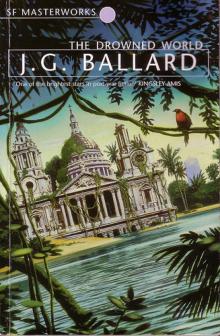 The Drowned World
The Drowned World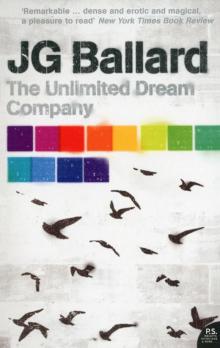 The Unlimited Dream Company
The Unlimited Dream Company Running Wild
Running Wild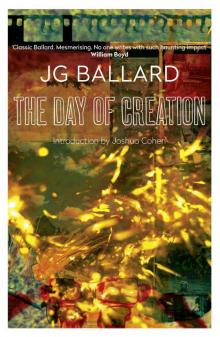 The Day of Creation
The Day of Creation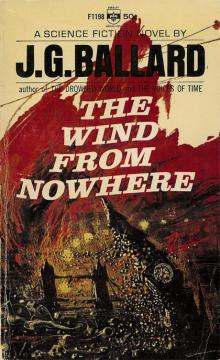 The Wind From Nowhere
The Wind From Nowhere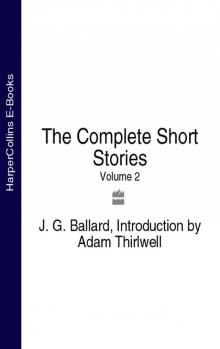 The Complete Short Stories, Volume 2
The Complete Short Stories, Volume 2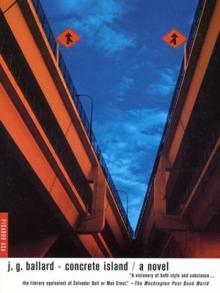 Concrete Island
Concrete Island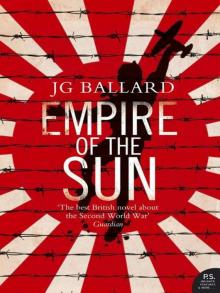 Empire of the Sun
Empire of the Sun The Kindness of Women
The Kindness of Women Vermilion Sands
Vermilion Sands Super-Cannes
Super-Cannes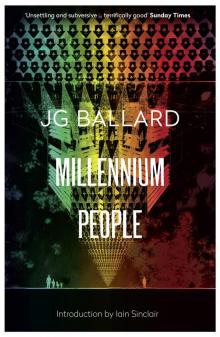 Millennium People
Millennium People The Complete Stories of J. G. Ballard
The Complete Stories of J. G. Ballard Crash
Crash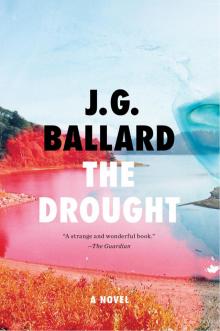 The Drought
The Drought The Atrocity Exhibition
The Atrocity Exhibition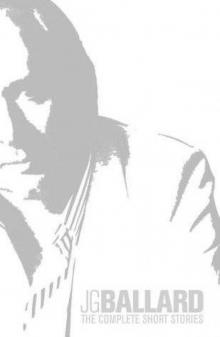 The Complete Short Stories: Volume 1
The Complete Short Stories: Volume 1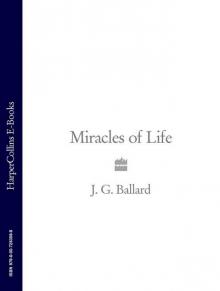 Miracles of Life: Shanghai to Shepperton: An Autobiography
Miracles of Life: Shanghai to Shepperton: An Autobiography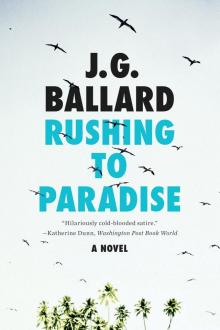 Rushing to Paradise
Rushing to Paradise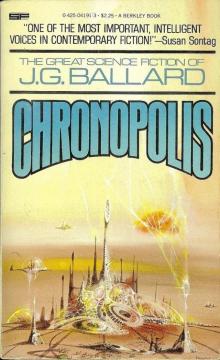 Chronopolis
Chronopolis Cocaine Nights
Cocaine Nights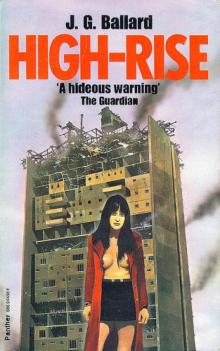 High Rise (1987)
High Rise (1987) The Complete Short Stories
The Complete Short Stories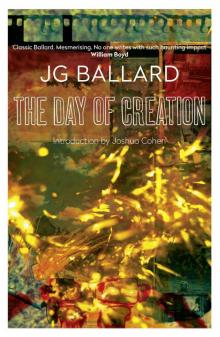 The Day of Creation (Harper Perennial Modern Classics)
The Day of Creation (Harper Perennial Modern Classics)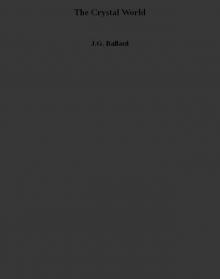 The Crystal World
The Crystal World